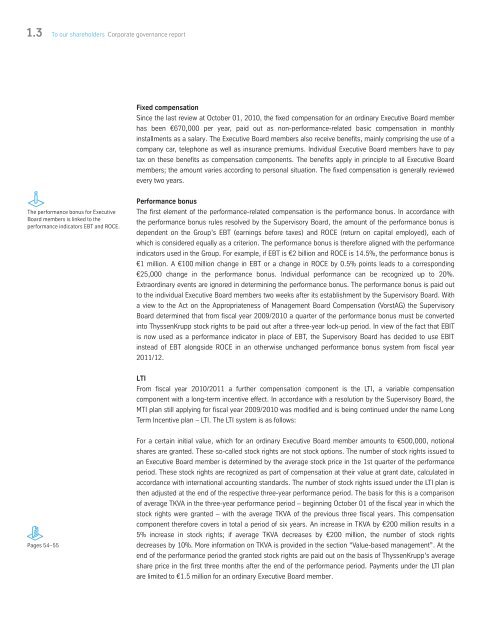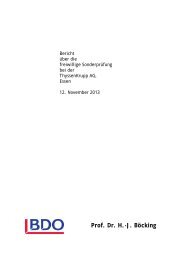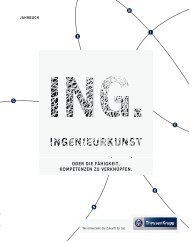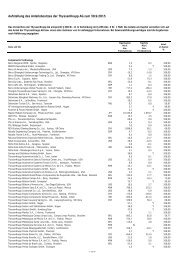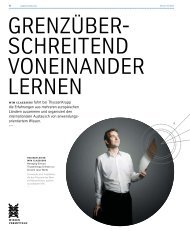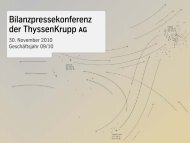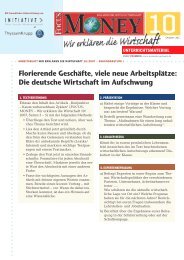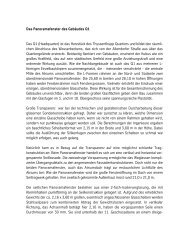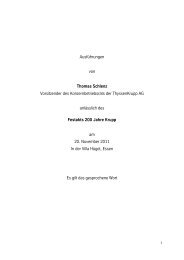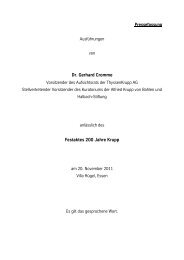PDF (10.9MB) - ThyssenKrupp AG
PDF (10.9MB) - ThyssenKrupp AG
PDF (10.9MB) - ThyssenKrupp AG
You also want an ePaper? Increase the reach of your titles
YUMPU automatically turns print PDFs into web optimized ePapers that Google loves.
1.3 To our shareholders Corporate governance report report<br />
The performance bonus for for Executive Board<br />
members Board members is linked is to linked the performance to the<br />
indicators performance EBT indicators and ROCE. EBT and ROCE.<br />
Pages 54 54–55<br />
- 55<br />
Fixed compensation<br />
Since the last review at October 01, 2010, the fixed compensation for an ordinary Executive Board member<br />
has been €670,000 per year, paid out as non-performance-related basic compensation in monthly<br />
installments as a salary. The Executive Board members also receive benefits, mainly comprising the use of a<br />
company car, telephone as well as insurance premiums. Individual Executive Board members have to pay<br />
tax on these benefits as compensation components. The benefits apply in principle to all Executive Board<br />
members; the amount varies according to personal situation. The fixed compensation is generally reviewed<br />
every two years.<br />
Performance bonus<br />
The first element of the performance-related compensation is the performance bonus. In accordance with<br />
the performance bonus rules resolved by the Supervisory Board, the amount of the performance bonus is<br />
dependent on the Group’s EBT (earnings before taxes) and ROCE (return on capital employed), each of<br />
which is considered equally as a criterion. The performance bonus is therefore aligned with the performance<br />
indicators used in the Group. For example, if EBT is €2 billion and ROCE is 14.5%, the performance bonus is<br />
€1 million. A €100 million change in EBT or a change in ROCE by 0.5% points leads to a corresponding<br />
€25,000 change in the performance bonus. Individual performance can be recognized up to 20%.<br />
Extraordinary events are ignored in determining the performance bonus. The performance bonus is paid out<br />
to the individual Executive Board members two weeks after its establishment by the Supervisory Board. With<br />
a view to the Act on the Appropriateness of Management Board Compensation (Vorst<strong>AG</strong>) the Supervisory<br />
Board determined that from fiscal year 2009/2010 a quarter of the performance bonus must be converted<br />
into <strong>ThyssenKrupp</strong> stock rights to be paid out after a three-year lock-up period. In view of the fact that EBIT<br />
is now used as a performance indicator in place of EBT, the Supervisory Board has decided to use EBIT<br />
instead of EBT alongside ROCE in an otherwise unchanged performance bonus system from fiscal year<br />
2011/12.<br />
LTI<br />
From fiscal year 2010/2011 a further compensation component is the LTI, a variable compensation<br />
component with a long-term incentive effect. In accordance with a resolution by the Supervisory Board, the<br />
MTI plan still applying for fiscal year 2009/2010 was modified and is being continued under the name Long<br />
Term Incentive plan – LTI. The LTI system is as follows:<br />
For a certain initial value, which for an ordinary Executive Board member amounts to €500,000, notional<br />
shares are granted. These so-called stock rights are not stock options. The number of stock rights issued to<br />
an Executive Board member is determined by the average stock price in the 1st quarter of the performance<br />
period. These stock rights are recognized as part of compensation at their value at grant date, calculated in<br />
accordance with international accounting standards. The number of stock rights issued under the LTI plan is<br />
then adjusted at the end of the respective three-year performance period. The basis for this is a comparison<br />
of average TKVA in the three-year performance period – beginning October 01 of the fiscal year in which the<br />
stock rights were granted – with the average TKVA of the previous three fiscal years. This compensation<br />
component therefore covers in total a period of six years. An increase in TKVA by €200 million results in a<br />
5% increase in stock rights; if average TKVA decreases by €200 million, the number of stock rights<br />
decreases by 10%. More information on TKVA is provided in the section “Value-based management”. At the<br />
end of the performance period the granted stock rights are paid out on the basis of <strong>ThyssenKrupp</strong>’s average<br />
share price in the first three months after the end of the performance period. Payments under the LTI plan<br />
are limited to €1.5 million for an ordinary Executive Board member.<br />
34


